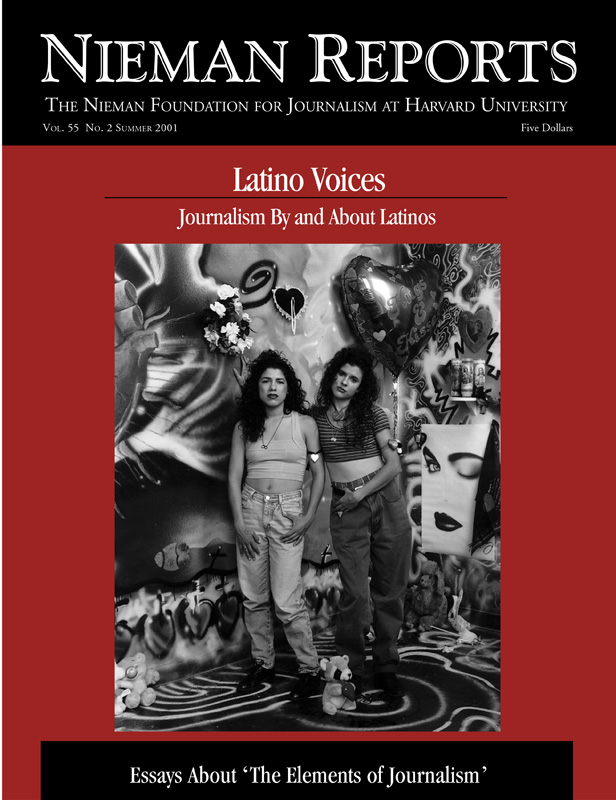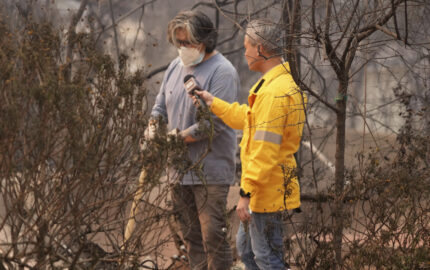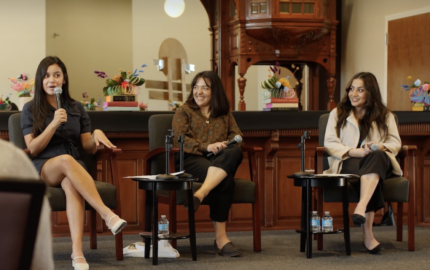
Latino Voices: Journalism By and About Latinos
How is the rapid increase in Hispanic American population affecting communities? What are the economic, social, cultural and educational benefits and hardships brought about by this significant demographic shift? Will the numbers and force of Hispanic voters alter the nation’s political landscape? The questions to be raised and stories to be told vary as greatly as do people portrayed by the word “Hispanic.”
All’s fair in love and war, as the
man claimed, but nobody makes
that claim about journalism.
The widespread perception that
journalists periodically or even routinely
deal from a stacked deck was one
of the most troubling developments
about newspaper work at the turn of
the millennium. And that perception
spreads still, like a leaking oil tanker
not yet contained. The cynicism
summed up in the old axiom “You
can’t fight city hall” oozed over into the
newspaper game: “You can’t believe
what you read in the newspaper.” Of
course, it is often what you read in the
newspaper that cleans up what you
can’t tolerate in city hall.
“The only security of all is in a free
press,” Thomas Jefferson concluded.
“The agitation it produces must be
submitted to. It is necessary to keep
the waters pure.” Virtually every journalist
accepts that, but our readers, the
citizenry, seem increasingly agitated.
They don’t like what we are doing to
politics, to government, to the news.
They suspect we’re feeding them
soft news, biased news, phony news,
news-on-the-cheap. “You are what you
eat” is as true of the news as of what you
put down your throat. And Twinkie-and-soda news doesn’t stick to ribs.
When survey after survey turns up
the dispiriting belief that the most reliable
purveyor of journalistic content is
local television news—local television
news!—newspaper people have to feel
discouraged. That’s finishing in a beauty
contest behind a burro. The Los Angeles
Times last year quoted a disillusioned
local TV person as saying, “If it
can’t be filmed from a helicopter, then
it’s not news.”
The fact that there is no major journalism
award for fairness seems to underscore that sense of mistrust that
blights our trade. During the last century,
the news industry became electrified
and fragmented; now it is atomized
by the Internet. Endless rounds of
surveys by perplexed proprietors seem
to agree that the more local the outlet,
the more it is trusted by the news
consumer; the larger and more remote
the institution, the less so.
The urge within the Taylor family of
Boston to give something back to the
craft coincided with a ripening sense
that something is not all that well off in
the land of journalism. As a result, the
Taylors, whose antecedents started and
ran The Boston Globe for a century
and a quarter before selling out to The
New York Times seven years ago,
amassed a $450,000 endowment for
Harvard’s Nieman Foundation in the
cause of fairness in journalism.
The notion of seeking out for recognition
examples of journalistic fairness
might seem quaint to some, ridiculous
to others. Fairness is easy to sneer at, if
yours is a sneering profession. (And
much of what is perceived to be the
work of newspapers today can be confused
with a sneer.)
Rare is the subject of a news story
who does not feel hard-done by the
coverage. There are the cops accused
of making less than righteous arrests,
the politicians who feel damned-if-do
and damned-if-don’t, and the bureaucrats
and businesspeople who feel
twisted and torched by what appears in
the paper. All contribute their daily
drop of cynicism to the eventual cataract
that becomes the nostrum: “You
can’t believe what you read in the newspaper.”
The plaint of an indicted-but-acquitted
cabinet member of a previous
administration epitomizes the helplessness
of those who claim to have
been unfairly treated by the profession
as a whole: “What office do I go to, to
get my good name back?”
Outgoing Nieman Curator Bill
Kovach offered his working definition
of fairness in journalism on his way out
the door a year ago when he said,
“Fairness in journalism is more than
objectivity. It includes honest and balanced
judgments in reporting, writing,
editing and presentation of news. The
test for fairness is whether people in
the news are offered an adequate opportunity
to express their views regardless
of the opinions of the reporters
and editors or the prevailing views
of society.
“Fairness means that journalists
should use their skills to give a voice to
those who are limited in their ability to
speak for themselves, whether poor or
rich, powerful or weak, famous or unknown.
Fairness keeps the playing field
of a democratic society level.”
Fairness is that level playing field we
all look for. It is the unstacked deck.
It’s getting your turn at bat after the
other side got theirs. It is a straight-ahead
fight without ganging up. Or
without delivering low blows or sucker
punches. Getting a fair shake. It is
implanted in America’s psyche.
At the core of our country’s idealism
is the conviction that freedom ultimately
means fairness. The hallowed
phrase “created equal” stems from the
easily grasped concept of fairness. For
immigrants it meant a fair crack at
some frontier land. And by the millions
they sailed here to get out from under
the absence of fairness back in a hundred
other countries.
Compulsion is the enemy, in all its guises, even when we are force-fed by
giant media fire hoses of information
whose gatekeepers might or might not
conduct their business in fair and
square fashion. Unfairness is essentially
authoritarianism: me telling you
what’s what, when it isn’t. The great
virtue of journalism is not the license
to print money, but to disseminate
ideas, freely, fairly. Those ideas are
what keep society more or less level,
more or less on the straight and narrow,
more or less fair.
As we lurch into this new millennium with the dot-com destabilization
of the newspaper game as practiced in
the last century, there should be a
quiet corner of the publishing game
where a word can be said for fairness.
Fairness is the first great philosophical
measure that children instinctively
grasp at a very young age. And the fact
that this principle of fairness seems to
be such a remote concern from much
of what is current news industry practice
shows how far the business has
strayed from the moral judgment any
normal kid can bring to bear on a
childhood game or situation.
If an average kid can get it, why can’t
we? Is it a case of can’t or won’t? And if
not, why not? Whatever the reasons
are, we can use more reflection, and
that’s the point of this effort.
David Nyhan is a columnist for The
Boston Globe. He recently was a
fellow at the Joan Shorenstein Center
on the Press, Politics and Public
Policy at Harvard University.
man claimed, but nobody makes
that claim about journalism.
The widespread perception that
journalists periodically or even routinely
deal from a stacked deck was one
of the most troubling developments
about newspaper work at the turn of
the millennium. And that perception
spreads still, like a leaking oil tanker
not yet contained. The cynicism
summed up in the old axiom “You
can’t fight city hall” oozed over into the
newspaper game: “You can’t believe
what you read in the newspaper.” Of
course, it is often what you read in the
newspaper that cleans up what you
can’t tolerate in city hall.
“The only security of all is in a free
press,” Thomas Jefferson concluded.
“The agitation it produces must be
submitted to. It is necessary to keep
the waters pure.” Virtually every journalist
accepts that, but our readers, the
citizenry, seem increasingly agitated.
They don’t like what we are doing to
politics, to government, to the news.
They suspect we’re feeding them
soft news, biased news, phony news,
news-on-the-cheap. “You are what you
eat” is as true of the news as of what you
put down your throat. And Twinkie-and-soda news doesn’t stick to ribs.
When survey after survey turns up
the dispiriting belief that the most reliable
purveyor of journalistic content is
local television news—local television
news!—newspaper people have to feel
discouraged. That’s finishing in a beauty
contest behind a burro. The Los Angeles
Times last year quoted a disillusioned
local TV person as saying, “If it
can’t be filmed from a helicopter, then
it’s not news.”
The fact that there is no major journalism
award for fairness seems to underscore that sense of mistrust that
blights our trade. During the last century,
the news industry became electrified
and fragmented; now it is atomized
by the Internet. Endless rounds of
surveys by perplexed proprietors seem
to agree that the more local the outlet,
the more it is trusted by the news
consumer; the larger and more remote
the institution, the less so.
The urge within the Taylor family of
Boston to give something back to the
craft coincided with a ripening sense
that something is not all that well off in
the land of journalism. As a result, the
Taylors, whose antecedents started and
ran The Boston Globe for a century
and a quarter before selling out to The
New York Times seven years ago,
amassed a $450,000 endowment for
Harvard’s Nieman Foundation in the
cause of fairness in journalism.
The notion of seeking out for recognition
examples of journalistic fairness
might seem quaint to some, ridiculous
to others. Fairness is easy to sneer at, if
yours is a sneering profession. (And
much of what is perceived to be the
work of newspapers today can be confused
with a sneer.)
Rare is the subject of a news story
who does not feel hard-done by the
coverage. There are the cops accused
of making less than righteous arrests,
the politicians who feel damned-if-do
and damned-if-don’t, and the bureaucrats
and businesspeople who feel
twisted and torched by what appears in
the paper. All contribute their daily
drop of cynicism to the eventual cataract
that becomes the nostrum: “You
can’t believe what you read in the newspaper.”
The plaint of an indicted-but-acquitted
cabinet member of a previous
administration epitomizes the helplessness
of those who claim to have
been unfairly treated by the profession
as a whole: “What office do I go to, to
get my good name back?”
Outgoing Nieman Curator Bill
Kovach offered his working definition
of fairness in journalism on his way out
the door a year ago when he said,
“Fairness in journalism is more than
objectivity. It includes honest and balanced
judgments in reporting, writing,
editing and presentation of news. The
test for fairness is whether people in
the news are offered an adequate opportunity
to express their views regardless
of the opinions of the reporters
and editors or the prevailing views
of society.
“Fairness means that journalists
should use their skills to give a voice to
those who are limited in their ability to
speak for themselves, whether poor or
rich, powerful or weak, famous or unknown.
Fairness keeps the playing field
of a democratic society level.”
Fairness is that level playing field we
all look for. It is the unstacked deck.
It’s getting your turn at bat after the
other side got theirs. It is a straight-ahead
fight without ganging up. Or
without delivering low blows or sucker
punches. Getting a fair shake. It is
implanted in America’s psyche.
At the core of our country’s idealism
is the conviction that freedom ultimately
means fairness. The hallowed
phrase “created equal” stems from the
easily grasped concept of fairness. For
immigrants it meant a fair crack at
some frontier land. And by the millions
they sailed here to get out from under
the absence of fairness back in a hundred
other countries.
Compulsion is the enemy, in all its guises, even when we are force-fed by
giant media fire hoses of information
whose gatekeepers might or might not
conduct their business in fair and
square fashion. Unfairness is essentially
authoritarianism: me telling you
what’s what, when it isn’t. The great
virtue of journalism is not the license
to print money, but to disseminate
ideas, freely, fairly. Those ideas are
what keep society more or less level,
more or less on the straight and narrow,
more or less fair.
As we lurch into this new millennium with the dot-com destabilization
of the newspaper game as practiced in
the last century, there should be a
quiet corner of the publishing game
where a word can be said for fairness.
Fairness is the first great philosophical
measure that children instinctively
grasp at a very young age. And the fact
that this principle of fairness seems to
be such a remote concern from much
of what is current news industry practice
shows how far the business has
strayed from the moral judgment any
normal kid can bring to bear on a
childhood game or situation.
If an average kid can get it, why can’t
we? Is it a case of can’t or won’t? And if
not, why not? Whatever the reasons
are, we can use more reflection, and
that’s the point of this effort.
David Nyhan is a columnist for The
Boston Globe. He recently was a
fellow at the Joan Shorenstein Center
on the Press, Politics and Public
Policy at Harvard University.


